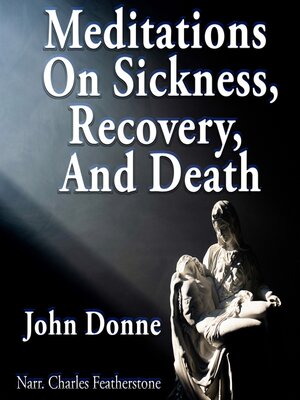Meditations On Sickness, Recovery & Death
audiobook (Unabridged) ∣ The meditations from Devotions Upon Emergent Occasions & his self-delivered funeral sermon, Death's Duel (A Consolation To The Soul Against The Dying Life And Living Death Of The Body)
By John Donne

Sign up to save your library
With an OverDrive account, you can save your favorite libraries for at-a-glance information about availability. Find out more about OverDrive accounts.
Find this title in Libby, the library reading app by OverDrive.



Search for a digital library with this title
Title found at these libraries:
| Library Name | Distance |
|---|---|
| Loading... |
By 1617, Donne had done it all. After being an MP, lawyer, womaniser, soldier, diplomat, father to twelve children by a secret wife, and the greatest poet of his age, he settled into the priesthood. Shortly thereafter, his wife died, prompting him to write a defence of suicide in God's eyes. She was soon followed by his 18 year old daughter died.
Then Donne fell gravely ill. Physicians were called, but none could agree on what to do. It seemed certain that he would die.
While bedridden from illness, Donne wrote a series of meditations, including his most famous piece, Meditation 17 (No man is an island) Weaving together his rage at his infirmity with deep insight on the interconnections between sickness, faith, monarchy, and the body social and politic, these meditations are immediately accessible to anyone that has suffered serious illness.
Seven years later, he delivered his final sermon. On the first Friday in lent, 1632, he stood before Charles I at Westminster Abbey, visibly emaciated and weak, and gave a sermon filled with blood and fire and thunder, an acceptance and validation of death without any mercy or pity. The greatest and most complex lyricist of his age went as he lived, speaking words visceral and complex, subtle and profound and profane.
"The sermon is one of the most "creepy" fragments of theological literature. There is not much that we should call doctrine, no pensive or consolatory teaching, no appeal to souls in the modern sense. The effect aimed at is that of horror, of solemn preparation for the advent of death,... The Dean of St. Paul's, whose reputation for learned sanctity had scarcely sufficed to shelter him from scandal on the ground of his fantastic defence of suicide, was familiar with the idea of Death, and greeted him as a welcome old friend whose face he was glad to look on long and closely." - Edmund Gosse







